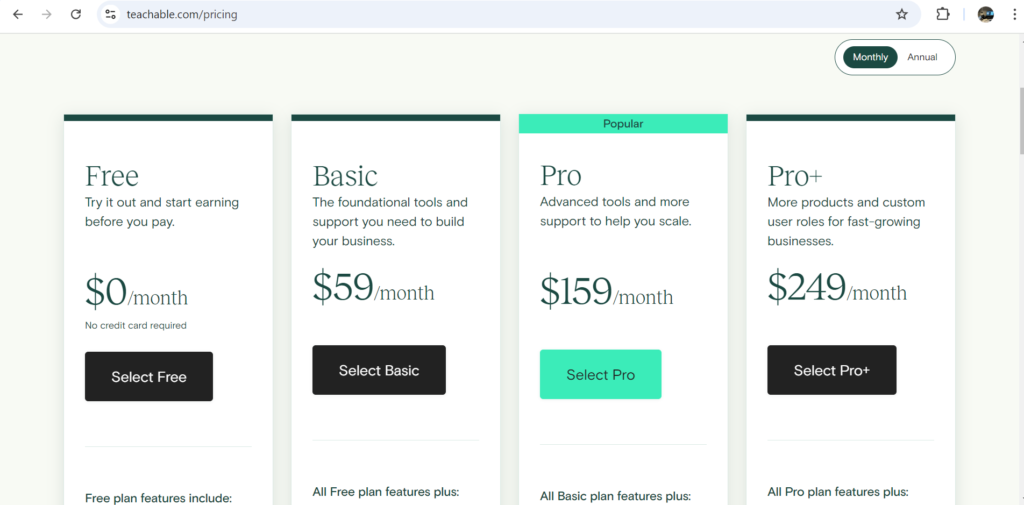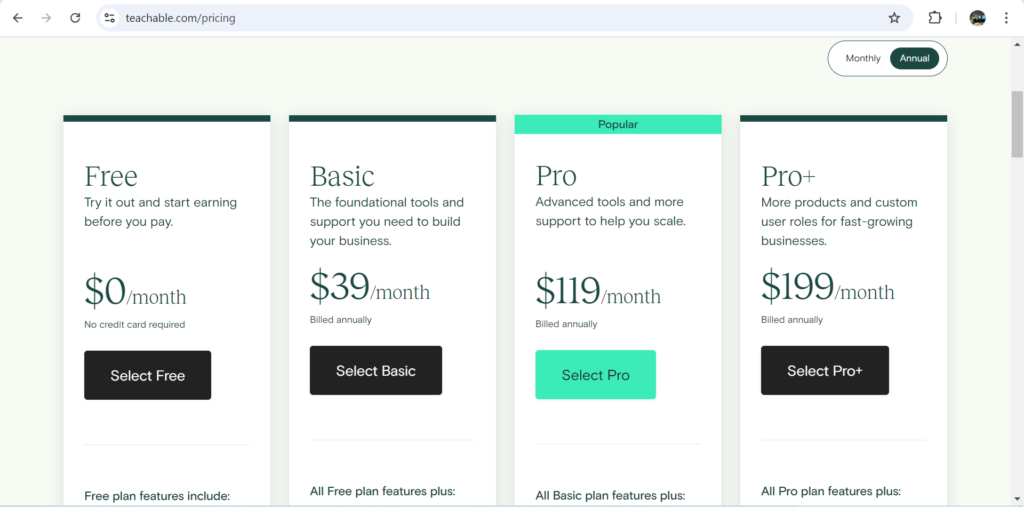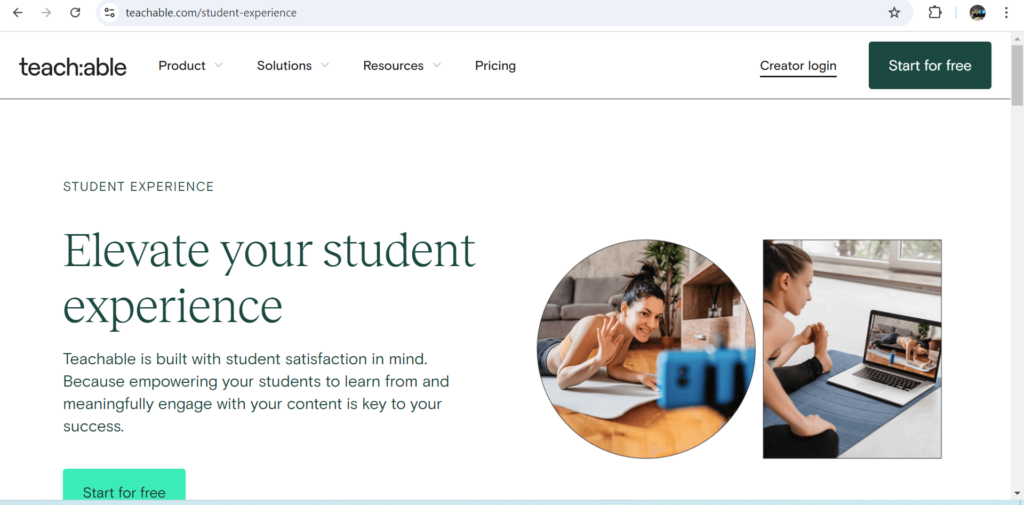Teachable
Teachable introduction
Teachable is a popular online course platform that allows creatives, coaches, and digital entrepreneurs of all kinds to quickly and easily sell online courses.
With this one platform, you can upload videos, add quizzes, create a landing page, email students, and accept payments all from one dashboard.
To create a comprehensive and competitive blog post for the keyword [teachable], you should compare products or features that will provide value to your readers and showcase your expertise. Here are 10 categories you might consider
Pricing
Teachable offers a range of pricing plans designed to accommodate different types of course creators, from individuals just starting out to larger businesses. Here’s a breakdown of the plans:
- Free Plan: Teachable provides a Free Plan with limited features. You can create and sell courses, but there is a transaction fee of $1 + 10% per sale. It’s a great option for testing the platform before committing to a paid plan.
- Basic Plan: The Basic Plan starts at $59 per month (or $39 per month if billed annually). It includes features like unlimited courses, students, and email marketing integration. However, there is still a 5% transaction fee on course sales.
- Pro Plan: The Pro Plan costs $159 per month (or $119 per month if billed annually). It eliminates transaction fees and adds advanced features such as course completion certificates, integrated affiliate marketing, and graded quizzes.
- Business Plan: For larger-scale operations, the Business Plan is available at $249 per month (or $199 per month annually). This plan includes additional features like bulk student enrollments, custom user roles, and priority support.


Which Plan is Right for You?
Choosing the right pricing plan on Teachable depends on your business size and goals. If you’re just starting out, the Free or Basic Plan may be enough to get you going, but the Pro Plan is often recommended for those looking to scale without transaction fees. The Business Plan is ideal for larger organizations or anyone needing advanced features for team-based course creation
Features
Teachable is packed with features that make it a popular choice for course creators of all levels. Below are some of the standout features that set Teachable apart from other online course platforms:
- Course Creation Tools: Teachable offers a drag-and-drop course builder, allowing you to create engaging multimedia lessons using videos, quizzes, text, and more. You can also drip content, setting scheduled releases to keep students engaged.
- Customization: Teachable allows you to fully customize the look and feel of your course pages without needing any coding skills. You can adjust colors, fonts, and layouts to match your brand, giving your courses a professional appearance.
- Student Management: With Teachable, you can track student progress, offer certificates of completion, and manage enrollments with ease. The platform also provides features like graded quizzes and feedback forms to enhance student engagement.
- Monetization Options: Teachable offers built-in tools to help you monetize your courses effectively. You can set up one-time purchases, subscription models, and even offer payment plans. There’s also support for discount codes and promotions.
- Sales and Marketing Tools: Teachable includes essential marketing tools like affiliate marketing, upsells, and customizable sales pages. You can integrate with email marketing services and track sales performance through detailed analytics.
Why These Features Matter
Teachable’s robust feature set gives course creators the flexibility and tools they need to build, market, and sell courses effectively. Whether you’re just starting or scaling your business, Teachable provides the essentials for success.
Customer Support
Teachable provides a range of customer support options to ensure that both course creators and students have a smooth experience using the platform. Whether you’re facing technical issues or need guidance on optimizing your course, Teachable offers several ways to get assistance:
- Knowledge Base: Teachable extensive knowledge base is a great starting point for resolving common issues. It includes detailed articles, how-to guides, and video tutorials on topics ranging from course creation to payment setup.
- Email Support: For more specific issues, Teachable offers email support. Users on the Free and Basic plans can expect responses within 24-48 hours, while those on the Pro and Business plans receive priority support with faster response times.
- Live Chat Support: Available to Pro and Business plan users, live chat support provides immediate assistance for urgent issues. This feature is highly useful for real-time troubleshooting and quick questions.
- TeachableU: TeachableU is an educational resource for creators looking to grow their online course business. It includes webinars, workshops, and in-depth courses on how to effectively use the platform and market your courses.
- Community Forum: Teachable also has an active community forum where users can connect, share tips, and seek advice from fellow course creators. It’s a valuable resource for learning from others’ experiences.
- Support for Students: Teachable doesn’t just cater to course creators; students also receive support via email and the platform’s help center. This ensures that learners can easily resolve any issues related to accessing content, payments, or technical difficulties.

Importance of Reliable Support
Reliable customer support is crucial, especially if you’re running an online business where downtime can impact sales and student satisfaction. Teachable’s blend of self-service resources, email, and live chat support ensures that help is available when you need it
Student Experience
One of Teachable’s strongest features is its ability to provide an exceptional learning experience for students. The platform is designed to make the learning process smooth, interactive, and accessible. Here’s a closer look at what students can expect:
- Easy Access to Courses: Teachable offers a user-friendly dashboard where students can easily access their enrolled courses. Once they sign up, students can start learning immediately, with no complicated setup or extra steps required.
- Mobile-Friendly Learning: Teachable’s platform is fully optimized for mobile devices, meaning students can access their courses on the go. Whether using a phone or tablet, students get the same seamless experience as they would on a desktop.
- Progress Tracking: Students can track their progress as they move through a course. Teachable includes a feature that marks lessons as complete, allowing learners to pick up right where they left off. This keeps them organized and motivated.
- Interactive Quizzes and Assignments: Teachable allows course creators to add quizzes, surveys, and assignments, which enhance engagement and help students retain information. These interactive elements make learning more dynamic and enjoyable.
- Course Completion Certificates: Upon completing a course, students can receive personalized certificates of completion. This adds a sense of achievement and provides tangible recognition of their efforts, which is especially beneficial for career-focused learners.
- Discussion Forums: Teachable enables creators to add discussion sections within courses. These forums allow students to ask questions, share ideas, and engage with peers, creating a sense of community and collaborative learning.
- Multimedia Learning: Teachable supports a variety of content types, including videos, PDFs, text lessons, and audio files. This variety keeps learning engaging and accommodates different learning preferences.
- Lifetime Access: In most cases, students on Teachable have lifetime access to their courses. This means they can revisit content anytime they want, reinforcing learning and making the platform highly flexible for busy learners.

Why the Student Experience Matters
A positive student experience not only ensures better learning outcomes but also increases the chances of repeat enrollments. Teachable’s student-centered features make the platform ideal for delivering high-quality educational experiences.
Pros and Cons
When choosing an online course platform, it’s important to weigh the pros and cons to determine if it’s the right fit for your needs. Here’s a breakdown of Teachable’s advantages and areas for improvement:
Pros of Teachable
- User-Friendly Interface: Teachable offers a simple, intuitive dashboard that makes it easy for course creators to build and manage courses without technical expertise.
- Extensive Customization: The platform allows for significant customization, letting creators match their course pages with their branding without needing to know any code.
- Comprehensive Course Features: With tools like quizzes, certificates of completion, and drip content, Teachable gives creators plenty of options to enhance the learning experience.
- Integrated Payment System: Teachable handles all payments, including VAT for international customers, which simplifies the sales process for creators.
- Mobile Optimization: The platform is optimized for mobile use, ensuring students can access courses easily from smartphones and tablets.
- No Transaction Fees on Pro and Business Plans: For creators on higher-tier plans, Teachable does not charge any transaction fees, making it more cost-effective for scaling businesses.
- TeachableU and Community Resources: Teachable provides extra educational resources and community support to help creators succeed in launching and marketing their courses.
Cons of Teachable
- Transaction Fees on Lower Plans: The Free and Basic plans come with transaction fees (5% on the Basic plan), which can eat into profits for creators just starting out.
- Limited Design Flexibility: While Teachable allows customization, it doesn’t offer full control over design elements like more advanced platforms. This could be a drawback for those looking for highly personalized layouts.
- Customer Support for Free Users: Free plan users have limited access to customer support, with no live chat or priority assistance, which may delay issue resolution.
- Higher Pricing for Advanced Features: Features like affiliate marketing, course completion certificates, and advanced reporting are only available on the higher-tier plans, which may be too expensive for beginners.
- No Built-In Course Marketplace: Unlike some competitors, Teachable doesn’t have a built-in course marketplace to help creators reach a broader audience, meaning creators are responsible for marketing their own courses.
Integration and Compatibility
One of Teachable’s key strengths is its ability to integrate with a wide range of third-party tools, enhancing both the functionality and ease of managing your online courses. Whether you’re looking to streamline your workflow, improve marketing efforts, or simplify payments, Teachable’s integrations make it easy to connect with the tools you already use. Here’s a closer look at how Teachable excels in terms of integration and compatibility:
- Email Marketing Platforms: Teachable integrates with popular email marketing services like Mailchimp, ConvertKit, and ActiveCampaign. This makes it easy for course creators to set up automated email sequences, nurture leads, and keep in touch with students.
- Payment Gateways: Teachable handles payments securely by integrating with Stripe and PayPal, allowing you to accept credit card payments and process transactions from students around the globe. This setup ensures fast, reliable, and secure transactions.
- Zapier Integration: Teachable’s integration with Zapier is a game-changer for automation. With Zapier, you can connect Teachable to over 2,000 different apps and automate tasks such as adding new students to a mailing list, sending reminders, or triggering notifications based on course activity.
- Analytics and Tracking: Teachable integrates with Google Analytics, helping creators track user behavior, website traffic, and course engagement metrics. This allows you to gain valuable insights into your audience and adjust your strategy accordingly.
- CRM Systems: Teachable can be connected to customer relationship management (CRM) systems like HubSpot and Salesforce. This integration is especially useful for creators managing large lists of students and leads, helping to organize communication and track interactions.
- Webinar and Live Streaming Tools: Teachable can also integrate with tools like Zoom or WebinarJam, enabling creators to offer live classes, Q&A sessions, or interactive webinars directly to students, enhancing the overall learning experience.
- Affiliate Marketing Integration: For those looking to expand their reach, Teachable’s affiliate marketing integration allows you to create and manage an affiliate program. Affiliates can promote your courses in exchange for commissions, helping to drive more traffic and sales.
Why Integration Matters
For course creators, being able to connect Teachable with other platforms is essential for scaling their business and providing a seamless experience for both themselves and their students. These integrations not only save time but also help automate processes, enhance marketing efforts, and improve overall efficiency.
Security and Privacy
When it comes to hosting online courses, security and privacy are critical, both for the course creators and their students. Teachable prioritizes security by implementing several measures to protect sensitive data and ensure that the platform is safe to use. Here’s how Teachable handles security and privacy:
- SSL Encryption: Teachable uses SSL (Secure Socket Layer) encryption across the platform to ensure that all data transferred between users and the platform is secure. This means that students’ personal information, login credentials, and payment details are protected from potential breaches.
- GDPR Compliance: For creators and students within the European Union, Teachable complies with GDPR (General Data Protection Regulation) requirements. This means that Teachable takes extra steps to protect user data, offering transparency in how personal data is collected, stored, and used.
- Secure Payment Processing: Teachable integrates with trusted payment gateways like Stripe and PayPal, which provide robust security measures such as fraud protection and PCI DSS (Payment Card Industry Data Security Standard) compliance. This ensures that all transactions are secure and sensitive financial data is handled appropriately.
- Regular Backups: Teachable performs regular data backups to prevent loss of information in the event of a system failure. This ensures that your courses, student data, and platform settings remain intact, even in rare cases of technical issues.
- Content Protection: Teachable allows course creators to disable video downloads, protecting intellectual property by ensuring that content cannot be easily stolen or distributed without permission. While students can view the content, they won’t be able to download or share it without authorization.
- Role-Based Access Control: Teachable offers role-based access control, allowing course creators to assign specific roles (e.g., admin, author, affiliate) with different permissions. This adds an extra layer of security by ensuring that only authorized individuals can access certain parts of the platform or manage specific tasks.
- Privacy Settings: Teachable gives creators control over their course privacy settings, including the option to make courses public or restrict access to specific students or groups. This ensures that your content is accessible only to the intended audience.
Why Security and Privacy Matter
As an online course creator, safeguarding student data and intellectual property is a top priority. Teachable’s robust security features and privacy measures provide peace of mind, ensuring that both your content and your students’ personal information are protected at all times.

